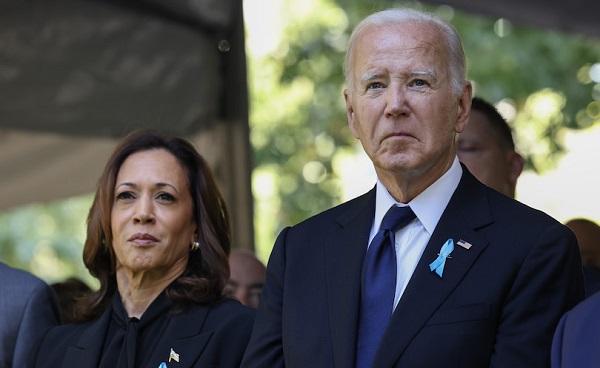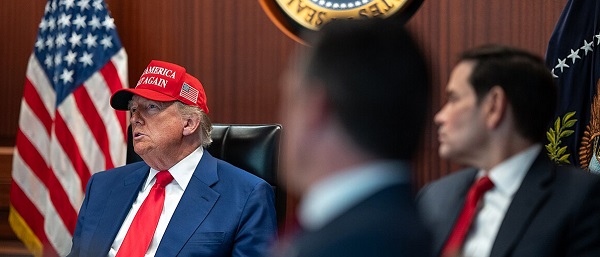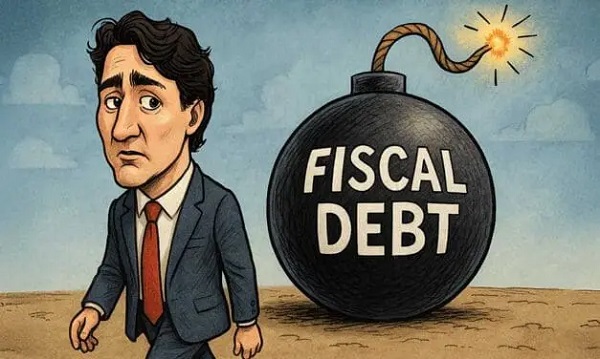Daily Caller
Biden Admin ‘Intentionally Buried’ Inconvenient Study To Justify Major Energy Crackdown, Sources Say


From the Daily Caller News Foundation
By Nick Pope
The Biden administration deliberately buried a final draft version of a study that would have undermined its January 2024 decision to pause approvals for liquefied natural gas (LNG) export projects, according to four Department of Energy (DOE) sources.
Former Energy Secretary Jennifer Granholm and former President Joe Biden announced the LNG freeze in January 2024, stating that it would remain in place until the DOE could conduct a fresh study of the climate and economic impacts of LNG export growth. The Biden DOE finalized a draft of the study in 2023 and subsequently buried it because the initial version’s findings would have contradicted the administration’s rationale for the LNG freeze, according to four sources inside the Trump DOE granted anonymity by the Daily Caller News Foundation to freely discuss a sensitive matter.
“The Energy Department has learned that former Secretary Granholm and the Biden White House intentionally buried a lot of data and released a skewed study to discredit the benefits of American LNG,” one DOE source told the DCNF. “They were prioritizing their own political ambitions over the interests of the American people, and the administration intentionally deceived the American public to advance an agenda that harmed American energy security, the environment and American lives.”
The Biden DOE had essentially completed the final draft version of the LNG impacts study by the end of September 2023, and that version was ready to be presented to top Biden officials shortly thereafter, Trump DOE sources told the DCNF. That particular iteration of the study, DOE sources told the DCNF, found that increasing U.S. LNG exports would actually bring about a reduction in global emissions relative to other scenarios.
That particular finding is at odds with Granholm’s analysis of the final version of the study released to the public in December 2024, in which she argued that any increase in LNG exports will result in higher global greenhouse gas emissions.
At the end of September 2023, a Biden administration official left a comment on the final draft version that instructed others to halt work on it until further notice, despite other language in the document stating that the final version was to be published sometime around the end of September 2023, Trump DOE sources told the DCNF. That version of the study was never released publicly, and the Biden DOE considered it to be a “working document” given that the agency subsequently categorized it as part of an internal deliberative process, according to DOE sources.
Additionally, the Biden DOE appears to have deleted numerous pages that appeared in the September 2023 draft version from what became the final version of the report released to the public at the end of 2024, the Trump DOE sources told the DCNF.
While the September 2023 and December 2024 versions of the paper bear the same name, the final version released to the public did not include a specific type of analysis of LNG exports known as the consideration of market effects, Trump DOE sources told the DCNF. That particular analysis — included in the buried September 2023 version of the study, but not the final product — found that U.S. LNG exports would bring down global emissions by displacing more polluting sources of energy abroad, and its absence from the December 2024 version allowed the Biden DOE to skew the final report’s findings against increasing LNG exports.
The evidence showing that the Biden administration buried the initial, politically inconvenient version of the study and misled the American public in the process will soon be transmitted to Congress and to the public, DOE sources told the DCNF.
Granholm and Biden each made statements after the pause was announced implying that the administration was freezing LNG export approvals to pursue answers that Trump DOE sources say had already been found, and that Biden officials chose to ignore. Specifically, both Biden and Granholm suggested that increased LNG exports would be a net negative for the global climate, with Granholm definitively saying as much after the final study was released to the public in December 2024.
“During this period, we will take a hard look at the impacts of LNG exports on energy costs, America’s energy security, and our environment. This pause on new LNG approvals sees the climate crisis for what it is: the existential threat of our time,” Biden said in a statement the day the pause was announced. “While MAGA Republicans willfully deny the urgency of the climate crisis, condemning the American people to a dangerous future, my Administration will not be complacent. We will not cede to special interests.”
Notably, House Speaker Mike Johnson recalled to The Free Press in January 2025 that Biden “genuinely didn’t know what he had signed” when he asked the president about the decision to freeze LNG approvals in January 2024, with the Republican adding that he left that meeting with the impression that Biden was not actually running the country in practice.
The DOE stated that it would “initiate” a review to determine whether increasing LNG exports is in the public interest in its statement on Jan. 26, 2024, the day the pause was announced.
Granholm claimed that the final version of the study released to the public in December 2024 demonstrates that “in every scenario, increases in LNG exports would lead to increases in global net emissions,” and that “a business-as-usual approach is neither sustainable nor advisable.” When the pause was first announced in January 2024, Granholm said in a statement that the review “will ensure that DOE remains a responsible actor using the most up-to-date economic and environmental analyses.”
Daily Caller
Nigeria Would Welcome US Intervention In Massacre Of Christians By Islamic Terror Groups


From the Daily Caller News Foundation
Nigeria said Sunday the country would welcome American intervention against Islamic extremist groups behind the massacre and persecution of Christians in the African nation.
Daniel Bwala, advisor to Nigerian President Bola Tinubu, told Reuters Sunday the country would welcome U.S. intervention to combat Islamic terrorists persecuting and massacring Christians within its borders, as long as Nigeria’s sovereignty was respected. President Donald Trump threatened Saturday on Truth Social to deploy U.S. forces in Nigeria if the nation did not do enough to stop Islamic terrorist organizations like Boko Haram.
“We welcome U.S. assistance as long as it recognizes our territorial integrity,” the advisor told Reuters.
Dear Readers:
As a nonprofit, we are dependent on the generosity of our readers.
Please consider making a small donation of any amount here.
Thank you!
Trump also threatened in his post to cut off aid to the nation in response to massacres of Christians. Open Doors, which tracks Christian persecutions worldwide, estimates that 3,100 Nigerian Christians have been killed so far in 2025, making up a large portion of the estimated 4,476 Christians murdered worldwide this year alone.
“If the Nigerian Government continues to allow the killing of Christians, the U.S.A. will immediately stop all aid and assistance to Nigeria, and may very well go into that now disgraced country, “guns-a-blazing,” to completely wipe out the Islamic Terrorists who are committing these horrible atrocities,” Trump said on Saturday. “I am hereby instructing our Department of War to prepare for possible action.”
Boko Haram is the most prominent Islamic terrorist organization in the nation, being responsible for a years-long campaign of targeted attacks against Christians, especially in the northern region of the country.
Business
Canada is still paying the price for Trudeau’s fiscal delusions

This article supplied by Troy Media.
 By Lee Harding
By Lee Harding
Trudeau’s reckless spending has left Canadians with record debt, poorer services and no path back to a balanced budget
Justin Trudeau may be gone, but the economic consequences of his fiscal approach—chronic deficits, rising debt costs and stagnating growth—are still weighing heavily on Canada
Before becoming prime minister, Justin Trudeau famously said, “The budget will balance itself.” He argued that if expenditures stayed the same, economic growth would drive higher tax revenues and eventually outpace spending. Voila–balance!
But while the theory may have been sound, Trudeau had no real intention of pursuing a balanced budget. In 2015, he campaigned on intentionally overspending and borrowing heavily to build infrastructure, arguing that low interest rates made
it the right time to run deficits.
This argument, weak in its concept, proved even more flawed in practice. Postpandemic deficits have been horrendous, far exceeding the modest overspending initially promised. The budgetary deficit was $327.7 billion in 2020–21, $90.3 billion the year following, and between $35.3 billion and $61.9 billion in the years since.
Those formerly historically low interest rates are also gone now, partly because the federal government has spent so much. The original excuse for deficits has vanished, but the red ink and Canada’s infrastructure deficit remain.
For two decades, interest payments on federal debt steadily declined, falling from 24.6 per cent of government revenues in 1999–2000 to just 5.9 per cent in 2021–22—thanks largely to falling interest rates and prior fiscal restraint. But that trend has reversed. By 2023–24, payments surged past 10 per cent for the first time in over a decade, as rising interest rates collided with record federal debt built up under Trudeau.
Rising debt costs are only part of the story. Federal revenues aren’t what they could have been because Canada’s economy has stagnated. High immigration, which drives productivity down, is the only thing masking our lacklustre GDP growth. Altogether, Canada was 35th among 38 countries in the Organization for Economic Co-operation and Development (OECD) for per capita GDP growth from 2014 to 2022 at just 0.2 per cent. By comparison, Ireland led at 45.2 per cent, followed by the U.S. at 20.8 per cent.
Why should a country like Canada, so blessed with natural resources and knowhow, do so poorly? Capital investment has fled because our government has made onerous regulations, especially hindering our energy industry. In theory, there’s now a remedy. Thanks to new legislation, the Carney government can extend its magic sceptre to those who align with its agenda to fast-track major projects and bypass the labyrinth it created. But unless you’re onside, the red tape still strangles you.
But as the private sector withers under red tape, Ottawa’s civil service keeps ballooning. Some trimming has begun, rattling public sector unions. Still, Canada will be left with at least five times as many federal tax employees per capita as the U.S.
Canada also needs to ease its hell-bent pursuit of net-zero carbon emissions. Hydrocarbons still power the Canadian economy—from vehicles to home heating—and aren’t practically replaceable. Canada has already proven that chasing net zero leads to near-zero per capita growth. Despite high immigration, the OECD projects Canada to have the lowest overall GDP growth between 2021 and 2060.
The Nov. 4 release of the federal budget is better late than never. So would be a plan to grow the economy, slash red tape and eliminate the deficit. But we’re unlikely to get one.
Trudeau may be gone, but his legacy of fiscal recklessness is alive and well.
Lee Harding is a research fellow with the Frontier Centre for Public Policy.
Troy Media empowers Canadian community news outlets by providing independent, insightful analysis and commentary. Our mission is to support local media in helping Canadians stay informed and engaged by delivering reliable content that strengthens community connections and deepens understanding across the country
-

 Business1 day ago
Business1 day agoYou Won’t Believe What Canada’s Embassy in Brazil Has Been Up To
-

 Censorship Industrial Complex1 day ago
Censorship Industrial Complex1 day agoSenate Grills Meta and Google Over Biden Administration’s Role in COVID-Era Content Censorship
-

 Business1 day ago
Business1 day agoMystery cloaks Doug Ford’s funding of media through Ontario advertising subsidy
-

 Automotive1 day ago
Automotive1 day agoCarney’s Budget Risks Another Costly EV Bet
-

 Environment22 hours ago
Environment22 hours agoThe era of Climate Change Alarmism is over
-

 Crime15 hours ago
Crime15 hours agoPublic Execution of Anti-Cartel Mayor in Michoacán Prompts U.S. Offer to Intervene Against Cartels
-

 Aristotle Foundation14 hours ago
Aristotle Foundation14 hours agoB.C. government laid groundwork for turning private property into Aboriginal land
-

 Justice14 hours ago
Justice14 hours agoA Justice System That Hates Punishment Can’t Protect the Innocent









